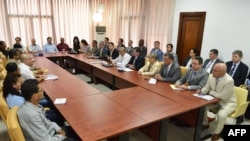Colombia's FARC guerrillas pledged on Monday to maintain their unilateral cease-fire despite a rebel attack last week that killed 11 government soldiers, saying peace talks with the government should not be broken for any reason.
The Colombian government responded by reaffirming that it, too, was committed to the peace process, but it blamed the FARC for the renewed violence and said the rebels had lost credibility.
The government and Marxist rebels from the Revolutionary Armed Forces of Colombia (FARC) have been engaged in peace talks in Havana for nearly two and a half years. The negotiations suffered a setback last week when the FARC apparently broke its unilateral cease-fire, killing 11 soldiers in Colombia's rural Cauca province.
In addition, one rebel was killed and 20 government soldiers were wounded.
The FARC called the combat a legitimate case of self-defense against encroaching government troops and proposed that unspecified observers investigate to determine who was at fault.
The Bogota government saw it as a brazen attack on troops carrying out an anti-drugs operation in southwestern Colombia, the latest breakout of violence in a 50-year-old war that has killed at least 220,000 people and displaced millions.
“We have resolved to declare a unilateral cease-fire to hostilities for an open-ended period that should transition into an armistice,” rebel commander Ivan Marquez told reporters in Havana, while warning the cease-fire could be lifted if the rebels come under attack.
Colombian President Juan Manuel Santos has also pledged to maintain negotiations, defying calls from political opponents to suspend the peace talks.
Santos's chief negotiator, Humberto de la Calle, launched an unusually animated critique of the rebels, accusing them of violating their word on the cease-fire and repeating Santos' claim that Colombians' patience with them was wearing thin.
“Ending the war is more imperative than ever,” de la Calle said in a statement read in Havana.
The rebels called a cease-fire in December and demanded the Colombian government reciprocate. Santos refused, but in recognition of the rebel cease-fire he called off bombing raids against FARC encampments just over a month ago.
That changed on Wednesday when he ordered the resumption of air raids in response to the rebel attack.
“The greatest damage as been to the FARC's credibility,” de la Calle said. “A cease-fire of this type must be serious, it must be verifiable and it has to be agreed at the table as part of the general agreement.”





